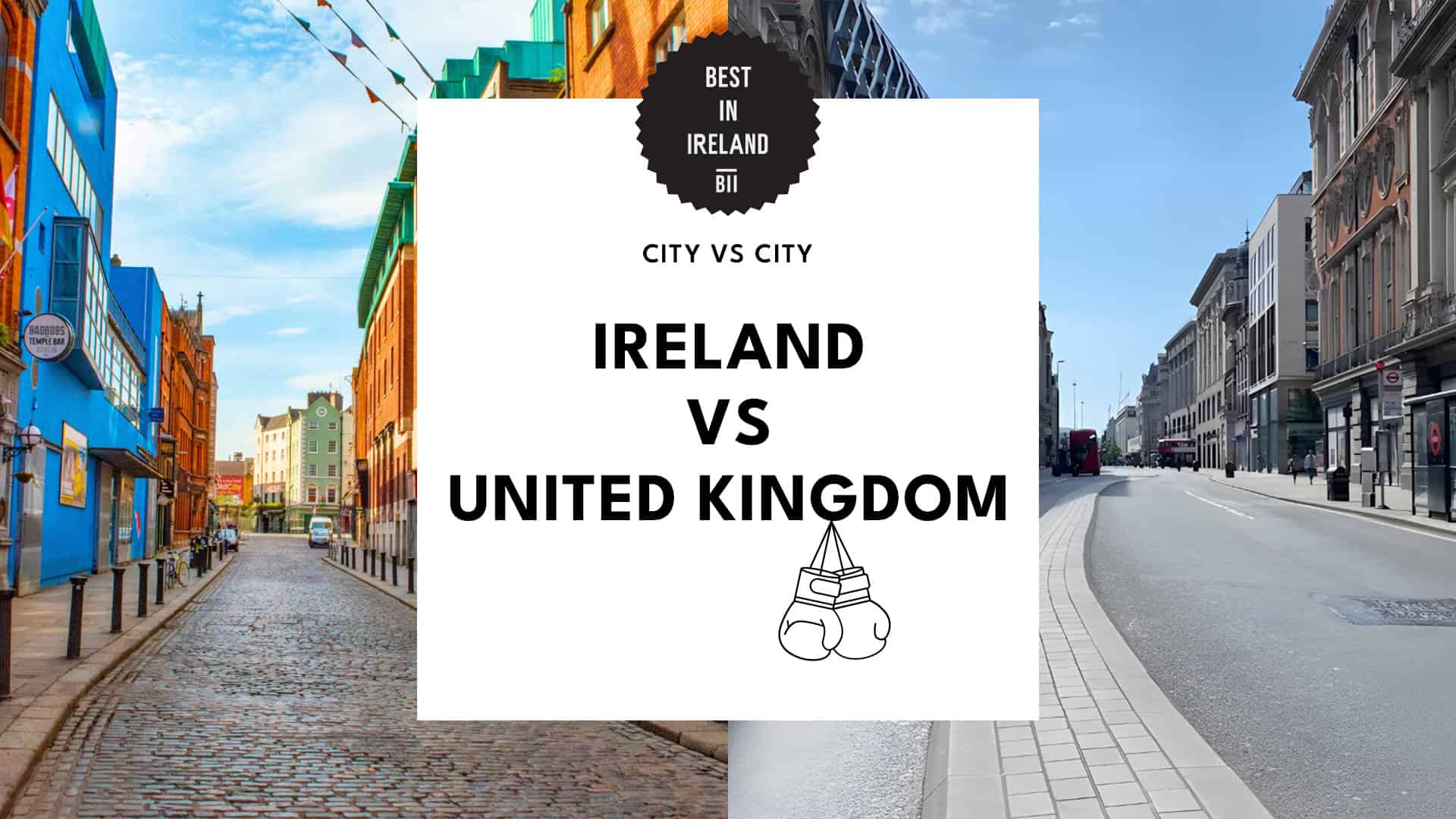Ireland or UK: Which One is Better for You?
Are you wondering which one is better: Ireland or the UK? Both countries have amazing things to offer, from culture and history to nature and nightlife.
But don’t worry, we’re here to help you figure out what suits you best. We’ll try to be fair and objective for a moment.
If you want to live in a safe, beautiful, and culturally rich country, choose Ireland. If you prefer more opportunities, diversity, and entertainment, go for the UK.
Want to know how we reached this verdict? Let’s walk you through the details as we compare them to factors like living expenses, population diversity, crime rates, and more.
Culture in Ireland vs. UK

Ireland is a great choice when it comes to culture, especially when compared to the UK. The Irish culture is rich and diverse, and the people are very warm and hospitable.
You’ll quickly feel at home as they welcome you with open arms and include you in their activities. Ireland is a place where you can make lasting friendships and enjoy life to the fullest.
Ireland is one of the world’s friendliest countries where the people are super friendly and always up for a chat. Irish people enjoy having conversations with anyone and everyone, and they can keep you engaged for hours with their stories and jokes.
That’s what they call ‘craic’ here, and it’s a big part of Irish culture. It means having fun, sharing news, gossiping, and enjoying a good chat with anyone.
Diversity and Demographics in Ireland vs. UK

While comparing size, gender, age, and life expectancy, Ireland and the UK show some differences, but not as significant as their ethnic diversity, where the UK is more diverse with a wider range of ethnic groups.
Based on the data from Worldometer below, one of the most obvious differences between Ireland and the UK is their size, with the UK being considerably larger in terms of land area and having a much larger population compared to Ireland.
In terms of demographic trends, the UK has a slightly higher median age and lower life expectancy compared to Ireland, suggesting an older population and potentially different factors influencing longevity.
The UK also has a more diverse population than Ireland in terms of ethnic groups, with a higher representation of various ethnicities. Ireland has a comparatively smaller diversity in its population.
Cost of Living in Ireland vs. UK

Surprisingly, living in Ireland is much more costly than living in the UK. Ireland is 16% pricier than the United Kingdom.
In fact, Ireland ranks as the 6th most expensive country in the world, while the UK is only the 12th. Whether it’s rent, consumer goods, or groceries, you’ll have to pay more in Ireland.
The table below gives you a glimpse of the living expenses in Ireland and the UK, based on the data from LivingCost.org.
As you can see, the main difference is in the rent and utilities, which are 25% higher in Ireland than in the UK.
However, the average salary after tax is also slightly higher in Ireland, which means that the living expenses can be covered for 1.3 months compared to 1.6 months in the UK.
Real Estate Prices in Ireland vs. UK

Excluding London, Irish cities generally have higher rental costs compared to British cities. On the other hand, purchasing a house in Ireland is usually more affordable than in the UK.
For those seeking a long-term investment, Ireland may present a more favorable choice than the UK.
The data from Numbeo shows that London tops the list for property prices and salaries, while Dublin follows closely in costs but not in income. Galway and Cork offer the best value for buyers, and Cardiff and Edinburgh are moderately priced and paid.
This table also shows that buying property in Ireland is generally cheaper than in the UK, especially in the city centres. However, renting is more expensive in Ireland than in the UK, except for London.
Career Opportunities in Ireland vs. UK

Ireland and the UK each have their own advantages in terms of career opportunities. Ireland, on average, offers higher salaries, while the UK benefits from a larger size and population, providing a broader range of job options.
The average annual salary for full-time workers in Ireland is around €45,000 ($49,099), while in the UK it’s about £33,000 ($41,015). However, these averages don’t tell the whole story as actual salaries depend on job title, experience, and location.
Ireland and the UK offer many jobs in various sectors, such as tech, pharma, finance, and healthcare. Whether you want to help patients, code apps, or crunch numbers, you can find your dream job in these countries.
Of course, there are also opportunities in other sectors that may suit your interests and goals. You just need to do some research and see what’s available.
Lastly, if you’re not a citizen of either country, you need to check the visa requirements before you apply for a job. You don’t want to get into trouble with immigration or miss out on a great opportunity because of visa issues.
Crime and Safety in Ireland vs. UK

According to the Global Peace Index, Ireland ranks 3rd in the world for safety and peace, while the UK ranks 34th.
Ireland has relatively low levels of crime compared to many other countries, and both countries have effective police forces and law enforcement systems.
Below is a comparison of the crime rates and safety levels of Ireland and United Kingdom, based on the data from Numbeo.com.
According to this table, United Kingdom has a higher Crime Index and a lower Safety Index than Ireland, which means that it is perceived as less safe and more crime-prone.
The difference between the two countries is 4.30 points in favor of Ireland, while not very large, it’s still significant.
Lifestyle in Ireland vs. UK

Lifestyle differences between the UK and Ireland depend on weather, entertainment, and healthcare. UK has less rain and more shows, but Ireland has better and free healthcare.
A good way to decide is to look at what kind of life you can have in each place. We’ll compare different aspects of each country, such as how the weather is, what you can do for fun, and how good the healthcare system is.
Weather in Ireland vs. UK

A poncho is a must-have item when visiting the UK and Ireland, where the weather can change in an instant. You might encounter rain and wind at any time of the year, so be prepared for anything.
If you’re looking for a place with less rain, the UK might have an edge over Ireland. But both have their fair share of sunny and warm days too, especially in the summer.
The average winter temperature in Ireland is between 9-14°C (48-57°F), while the summer temperature is between 16-20°C (61-68°F), according to Met Eireann.
The UK has different temperatures depending on the region. For instance, London has an average winter temperature of 6-8°C (43-46°F) and an average summer temperature of 18-20°C (64-68°F).
Things to Do in Ireland vs. UK

Socializing in pubs is common in Ireland and the UK, but non-alcoholic options are also popular. Non-alcoholic beer sales in Ireland increased by 210% from 2017 to 2021, and 20% of UK drinkers choose non-alcoholic drinks.
Both countries also love sports, such as soccer, rugby, cricket, Gaelic football, and hurling. Going to a game or match is a fun way to join the local culture and make friends.
Music is another passion for both nations. You can enjoy traditional Irish music at pubs or ceilidhs, or catch a live concert by famous artists in the UK cities.
The UK and Ireland are both great places to live, but the UK has an edge when it comes to entertainment. You can enjoy amazing shows from international stars in the UK, which makes it more fun.
Healthcare in Ireland vs. UK

Both Ireland and the UK offer free or low-cost public healthcare, but they differ in quality and accessibility.
Ireland’s public health services are available to anyone who lives or plans to live there for a year, and they provide excellent care. Private insurance is optional, but it can speed up the process and give more options.
The UK’s National Health Service (NHS) covers all aspects of healthcare, but it is overwhelmed by the huge demand and the lack of funding. Long waiting times and poor performance are common complaints about the NHS.
Therefore, Ireland has a better healthcare system than the UK, because it offers more reliable and efficient public health services, while also allowing for private alternatives.
Ireland vs. UK: How They Stack Up
So, what do you think? Both countries have pros and cons, and it’s not easy to pick one. It really depends on what you value most in your life and how you want to live it.
To sum up, here’s our summary of which country wins based on the different aspects we’ve covered.

